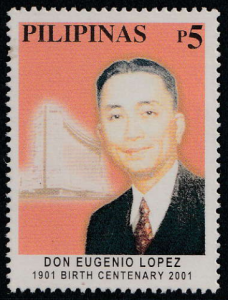Trivia about Don Eugenio H. Lopez
Don Eugenio H. Lopez was born on July 20, 1901 in Jaro, lloilo to Benito and Presentacion Hofilena. After graduating with an AB cum laude from the Ateneo de Manila in 1919, Don Eugenio went on to Law studies at the University of the Philippines, graduating in 1923. He passed the bar exams in 1928 and underwent a year of post-graduate studies in law at Harvard. But Don Eugenio spent only three years in law practice. instead, in 1928, he decided to embark on twin careers as a pioneering businessman and a crusading newspaper publisher.
As a pioneering businessman, Don Eugenio put up the first Asian airline, lloilo Negros Air Express company (lNAE) in 1933. After WW II destroyed INAEC’s planes, Don Eugenio put up in 1945 the first Asian airline to ply international routes, the Far East Air Transportation lnc.(FEATI). He also made his mark in sugar milling, with the acquisition of the Binalbagan-lsabela sugar company (BlscoM), the biggest sugar central in southeast Asia.
Don Eugenio truly proved his pioneering vision and business acumen with the acquisition of the Manila Electric Company (Meralco). In 1962, Don Eugenio led an intrepid band of Filipino entrepreneurs to buy Meralco from General Public Utilities (GPU) and then to prove that Filipinos could run Meralco even better than the Americans. Under Don Eugenio, Meralco increased its generating capacity fivefold in the years 1962-72, while simultaneously offering the cheapest power in Asia.
As a crusading publisher, Don Eugenio led his newspapers, the Iloilo Times, El Tiempo and The Manila Chronicle in campaigns against graft and abuses by politicians. On several occasions, his crusades earned him the ire of Malacanang, but Don Eugenio pressed on undaunted. To complement his presence in print media, he went into radio and TV with the founding of the Chronicle Broadcasting Network (CBN) in 1956 and the acquisition of Alto Broadcasting (ABS) in 1957, which were the roots of the top broadcasting network today, ABS-CBN.
Don Eugenio also distinguished himself as a philanthropist. He put up the Lopez Memorial Museum in 1960 to bring his impressive collection of art and Filipiniana to the public. In 1968, he created the Eugenio Lopez Foundation to administer the Museum and institutionalize his philanthropic efforts. He also donated the funds for the building ot the Asian institute of Management (AlM). Don Eugenio also gave scholarships, endowed chairs and other bequests to his Alma maters, Harvard, Ateneo and the UP. ln 1972. Harvard University acknowledged his stellar career and his philanthropic contributions by giving him its Distinguished Service Award.
With the coming of Martial Law in 1972, the Marcos regime, an avowed enemy ol the Lopez family, seized and dismantled the Lopez business empire. Don Eugenio lived in exile in San Francisco until his death on July 6, 1975. His offsprings have rebuilt the Lopez Group and brought it once more to preeminence in Philippine business. They consider their success since 1986 as a vindication and continuation of their fathers legacy and values.
Don Eugenio was married to Pacita Moreno. He had five children: Eugenio Jr., Oscar, Presentacion, Manuel and Roberto.

Recent Comments